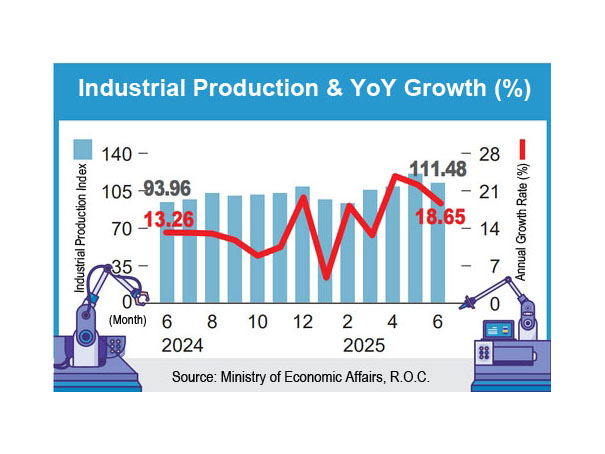Taiwan's Manufacturing Production Index Hits All-Time June High, Driven by AI Boom
2025/07/24 | By CENSRecord Growth for 16 Consecutive Months; Q2 Sees Largest Surge in 16 Years
Taiwan’s manufacturing sector continued its strong momentum in June, with the Manufacturing Production Index (MPI) reaching 112.11, a 20.03% year-on-year increase, marking the highest level ever recorded for the month of June. According to the Ministry of Economic Affairs (MOEA), this also represents the 16th consecutive month of positive growth.
The second quarter of 2025 proved equally robust, as the quarterly MPI surged by 22.84% year-on-year, not only extending its six-quarter growth streak, but also posting the biggest single-quarter increase in 16 years, signaling solid industrial recovery and expansion.

AI Demand Propelling Electronics Sector
MOEA Statistics Department Director Huang Wei-jie noted that the June results, while slightly lower than forecasts due to a transition period between old and new product lines, still reflected strong overall performance. He emphasized that AI applications, high-performance computing, and cloud-based services have become the main drivers of manufacturing growth, particularly in the information and electronics sectors.
Looking ahead, the MOEA forecasts July manufacturing output to continue growing between 19.5% and 23.7% year-on-year, fueled by sustained AI-related demand.
Industrial Production Index Also Hits Record
In addition to the MPI, Taiwan’s overall Industrial Production Index (IPI) climbed to 111.48 in June, up 18.65% from the previous year, also setting a new record for the month and marking 16 consecutive months of growth.
Tariff Impact from U.S.-Japan Deal Still Unclear
Regarding the recently announced U.S.-Japan tariff agreement—which will see Japan lower its reciprocal tariffs to 15%—concerns have emerged over possible implications for Taiwan’s machinery exports to the U.S. However, Mr. Huang explained that as U.S. tariff rates on Taiwan have not yet been announced, it remains too early to assess potential impacts.
He added that tariff effects are highly relative and supply-chain dependent, noting that Taiwanese manufacturers supplying components to Japanese firms may actually benefit, depending on their upstream or downstream position in the industrial chain.
Mixed Outlook for Traditional Industries
While the high-tech sector continues to thrive, Mr. Huang cautioned that some traditional industries are still facing weak market demand and continued output contraction, which is slightly offsetting gains made by electronics and AI-driven manufacturing.

